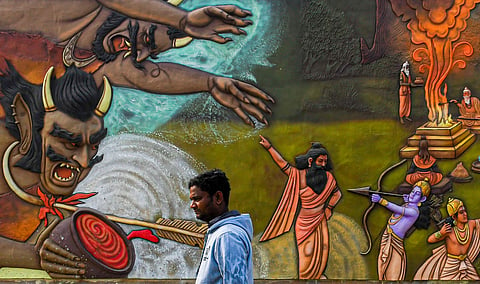Southasia Review of Books podcast #05: Siddhartha Deb on India’s macabre new realities
Welcome to the Southasia Review of Books Podcast from Himal Southasian, where we speak to celebrated authors and emerging literary voices from across Southasia. In this episode, Shwetha Srikanthan speaks to Siddhartha Deb about his recent novel The Light at the End of the World, and his latest collection of essays, Twilight Prisoners: The Rise of the Hindu Right and the Fall of India.
The Light at the End of the World, Siddhartha Deb’s first novel in fifteen years, reinvents Southasian fiction for our time.
The novel, beginning and ending in a dystopian future of authoritarianism and climate disaster, blurs the lines between realism and speculative fiction. It captures the puzzle of contradictions that is modern India today, and traces it back to the many moments of apocalypse in the Subcontinent’s history. At its core, the story is also about how certain tragedies and certain kinds of violence are repeated.
Over the past decade and a half, India has pivoted from a seeming success story, revealing itself to be a stranger-than-fiction dystopia. In his recently published collection of essays, Twilight Prisoners, Siddhartha paints a damning picture of these darkest of turns in India’s recent past. It is a powerful exploration of the rise of Hindu Nationalism and its impact on dissenting voices and marginalised communities. And most importantly, it’s a timely reminder that those who resisted and are resisting – India’s twilight prisoners if you will – are not forgotten. As long as there is resistance and remembrance, there is still hope.
Born in Shillong, in northeastern India, Siddhartha Deb lives in Harlem, New York. His fiction and nonfiction have been longlisted for the International Dublin Literary Award, shortlisted for the Orwell Prize, and been awarded the Pen Open prize. His journalism and essays have appeared in the New York Times, The Guardian, the New Republic, Dissent, The Baffler, n+1, and The Caravan.
Episode notes:
‘Unmasking Modi’ by Siddhartha Deb. The New Republic (June 2016)
‘The Worst Industrial Disaster in the History of the World’ by Siddhartha Deb. The Baffler (Fall 2014)
‘Those Mythological Men and Their Sacred, Supersonic Flying Temples’ by Siddhartha Deb. The New Republic (June 2015)
Siddhartha Deb’s playlist for his novel The Light at the End of the World. Largehearted Boy (August 2023)
‘The liberals who loved Modi’ by Praveen Donthi. The Caravan (May 2019)
The Story of a Shipwrecked Sailor by Gabriel García Márquez (1989)
The Great Derangement: Climate Change and the Unthinkable by Amitav Ghosh (July 2016)
History’s Angel by Anjum Hasan. Bloomsbury Publishing (January 2023)
Quarterlife by Devika Rege. Fourth Estate India (June 2023)
The Night of Broken Glass by Feroz Rather. HarperCollins India (July 2018)
Gita Press and the Making of Hindu India by Akshaya Mukul. Harper Collins India (August 2015)
Gandhi’s Assassin: The Making of Nathuram Godse and His Idea of India by Dhirendra Jha. Vintage Books (January 2022)
Ants Among Elephants: An Untouchable Family and the Making of Modern India by Sujatha Gidla. Farrar, Straus and Giroux (July 2017)
This episode is now available on Soundcloud, Spotify, Apple Podcasts and Youtube.
Southasia Review of Books is a podcast and a monthly newsletter that threads together our latest reviews and literary essays, with curated reading lists and publishing news from around the region.
A new episode of the SaRB Podcast will be available once every four weeks. A special reading list curated by Siddhartha Deb will be featured in this month’s SaRB newsletter. You can subscribe to the newsletter here.
If you like this episode, please share widely, rate, review, subscribe and download the show on your favourite podcast apps. Please consider becoming a Himal Patron today to support the Southasia Review of Books.

